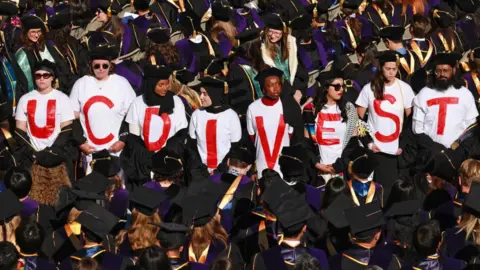Virginia Commonwealth University students walk out of graduation
 Hearst Newspapers via Getty Images
Hearst Newspapers via Getty ImagesDozens of Virginia Commonwealth University students walked out of their graduation ceremony on Saturday, partly over a speaker's response - the state governor - to campus protests.
It comes as US school officials brace for possible disruptions of commencement events over Israel-Gaza war protests.
Dozens of colleges roiled by protests are holding graduations this weekend.
More than 2,000 people have been arrested since protest began mid-April.
Social media posts on Saturday showed Virginia Commonwealth University (VCU) students in caps and gowns leaving the room as Republican Governor Glenn Youngkin began his commencement address.
Some students had criticised the selection of Mr Youngkin as that year's speaker, both for his opposition to a racial literacy requirement being considered by VCU as well as for saying that encampments on college campuses should not be allowed.
Video posted online show some of the VCU protesters chanting "disclose, divest - we will not stop we will not rest".
Many students protesters in the US are demanding that their schools, many with massive endowments, financially cut ties from Israel.
People were clapping so loudly, members of the audience couldn't hear Mr Youngkin speak, Sereen Haddad, a second-year VCU student who helped organise the protest, told the BBC on Saturday evening.
Ms Haddad said some 150 people marched outside the ceremony, including students who walked out.
Thirteen people, including six students, were arrested at VCU when the encampment there was cleared by police on 29 April.
Mr Youngkin's speech went on as planned despite the walk-out. He later posted a message on social media congratulating graduates and did not comment on the protest.
At another commencement on Saturday, the University of California Berkeley Chancellor Carol Christ opened the ceremony by acknowledging the weeks of demonstrations from protesters.
"I'm saddened by how this conflict has divided students, faculty and staff," she said, according to the LA Times.
The remarks drew some applause as well as chants of: "Hey hey, ho ho, the occupation has got to go".
Some 20 students stood up and began waving signs, Palestinian flags and chanting, "Free Palestine" as during another speech, the San Francisco Chronicle reported, and they were later joined in chants by more graduates.
In a statement, UC Berkeley said that the event continued despite being "unfortunately disrupted" and that protesters who left the ceremony did so voluntarily. No one was arrested.
The protest came a day after eight students wore shirts spelling out "UC divest" during the law school graduation ceremony.
In the past month, the BBC has counted more than 130 US colleges and universities with protests against the ongoing war in Gaza.
Campus protests have led to some graduation ceremonies being cancelled, including at New York's Columbia University, which said last week it was ditching its 15 May commencement in favour of smaller celebrations to focus on keeping students "safe".
Many schools have brought in additional measures for the graduation events, such as requiring identification, instituting clear bag policies, and issuing warnings that people causing a disruption will be removed.
Some commencement speakers have also withdrawn, like author Colson Whitehead, who said he would no longer be the keynote speaker at the University of Massachusetts Amherst event after police cleared an encampment there.
Others have had their speeches cancelled.
The University of Vermont and Xavier University of Louisiana recently rescinded invitations to have the US ambassador to the UN, Linda Thomas-Greenfield, speak under students pressure to drop the Biden administration official from the line-up.
Some universities, including University of Pennsylvania and Massachusetts Institute of Technology, had police clear encampments and arrest protesters on Friday ahead of graduation ceremonies.
At the University of Arizona, police used "loud munitions" and "chemical munitions" to clear remaining protesters from an encampment, the university said.
While some universities have avoided clearing the protest camps, others have brought in police to help remove demonstrators.
Earlier this week, the chief of police at Arizona State University was placed on paid administrative leave "pending a review" after the school received a number of complaints about his handling of the campus protests in late April, ASU said on Friday.
